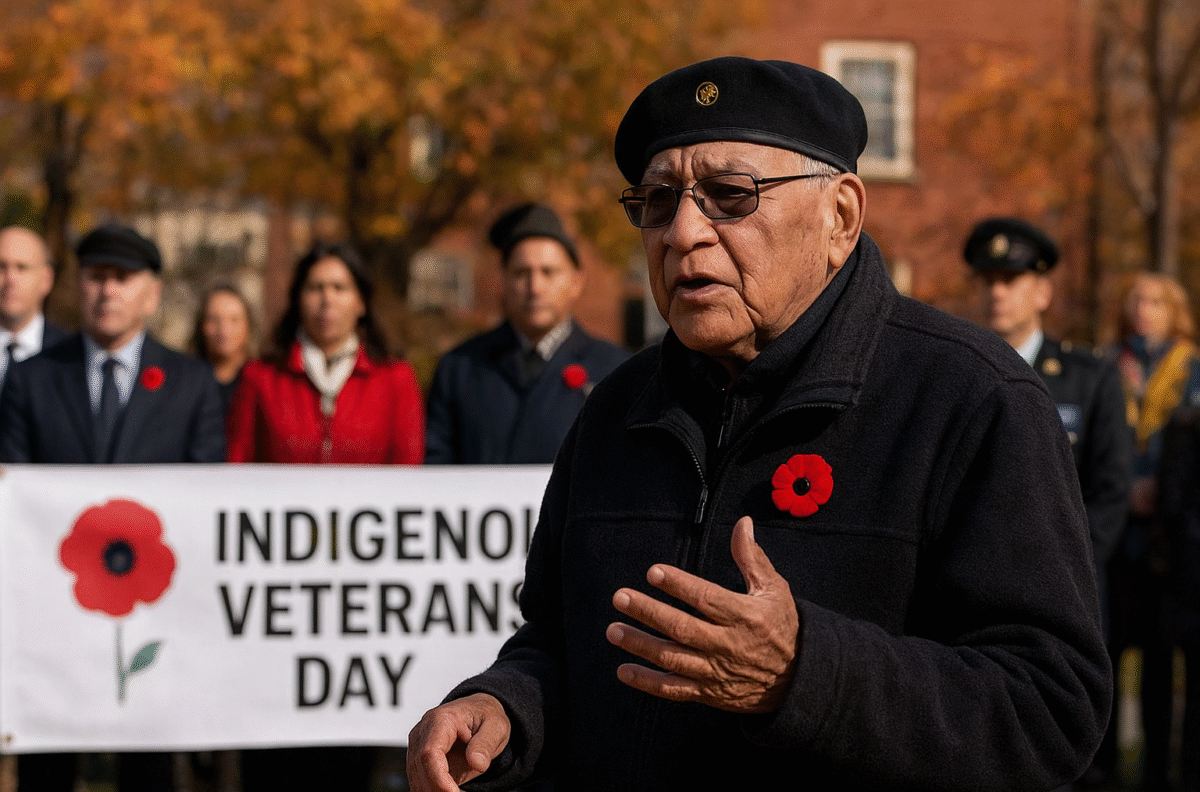🇨🇦 “forgotten heroes: Indigenous Veterans honoured as Canada reflects on centuries of service and sacrifice

🇨🇦
Across Canada, the sound of drums, song, and solemn reflection marked National Indigenous Veterans Day — a day that recognizes the extraordinary service and sacrifice of First Nations, Métis, and Inuit peoples in the country’s military history.
From the quiet halls of remembrance in Winnipeg to the open skies of Saskatchewan, stories of Indigenous veterans like Bill Shead, Mahekan Ahenakew, Evan Taypotat, and Cy Standing remind Canadians that the path to freedom has always been walked together — though not always equally acknowledged.
Honouring Service and Reconciliation
For Bill Shead, a Peguis First Nation member who spent 35 years in the Royal Canadian Navy, the day is deeply personal. Standing among fellow veterans at a ceremony in Winnipeg, Shead reflected on his journey as one of the few Indigenous sailors in his unit.
“It’s time Canada truly recognizes that Indigenous people have long stood in uniform, serving with courage and pride,” he said.
Shead emphasized that Indigenous veterans form a bridge between Indigenous and non-Indigenous Canadians — a bond forged in shared service, duty, and sacrifice.
Winnipeg became the first city to formally recognize November 8 as Indigenous Veterans Day in 1993 — a step later followed by the federal government in 1994. Today, it stands as a national symbol of remembrance and reconciliation.
New Traditions of Honour
For Renata Meconse, whose late father Joseph was a respected First Nations veteran, remembrance comes with emotion and pride. “I miss my dad dearly,” she said, holding back tears. “He never missed a ceremony.”
This year, Meconse helped organize the first-ever Indigenous Veterans Day Powwow at Sergeant Tommy Prince Place in Winnipeg — a fitting tribute to one of Canada’s most decorated Indigenous soldiers. The event celebrates culture, memory, and healing, with proceeds from commemorative t-shirt sales going toward Christmas hampers for Indigenous veterans.
Voices of the Next Generation
Younger veterans like Mahekan Ahenakew are now carrying the torch of remembrance. Raised in Ahatahkakoop Cree Nation, he joined the Canadian Army at 17 after being inspired by the honour given to veterans at a powwow.
His traditional upbringing helped him excel in the field — tracking, reading the land, and surviving under pressure. After serving in Afghanistan with Princess Patricia’s Canadian Light Infantry, Ahenakew now teaches survival training infused with nêhiyawak (Cree) values.
“November always brings a change in me,” he said quietly. “It’s when I remember those who didn’t come back.”
A New Chapter of Recognition
For Evan Taypotat, Chief of Kahkewistahaw First Nation and newly appointed honorary colonel of the Canadian Forces Snowbirds, the day offers bittersweet healing.
“Many Indigenous veterans didn’t get the same benefits as others,” he said. “Having this day helps ease that pain.”
Taypotat, who served in Afghanistan in 2011, said wearing the uniform always made him think of his community and ancestors. “I’m proud to be Cree. When I put that uniform on, I represent them all.”
Remembering the First Warriors
Cy Standing, 88, from Wahpeton Dakota Nation, served in the Royal Canadian Air Force as an electronics technician after World War II. For him, the concept of a veteran extends beyond the modern military.
“Our first veterans were the warriors — Sitting Bull, Crazy Horse — those who defended our way of life,” he said.
Serving overseas, Standing said he relied on his Dakota spirituality to endure the loneliness. “It was the best education I ever had. The people remembered Canadians from the war — it felt like home.”
A Legacy Beyond Uniforms
Indigenous Veterans Day is more than remembrance — it’s a call for recognition, equality, and continued reconciliation. As Canada honours its soldiers, voices like Shead’s and Meconse’s remind the nation that Indigenous service is not a footnote in history, but a foundation of it.
FAQs
1. When is Indigenous Veterans Day celebrated?
It’s observed annually on November 8 to honour First Nations, Métis, and Inuit veterans who served in Canada’s armed forces.
2. Why was the day created?
To recognize Indigenous service members who were often overlooked in mainstream Remembrance Day events and denied equal benefits.
3. How can Canadians participate?
By attending local ceremonies, powwows, or educational events — and supporting Indigenous veterans’ organizations.
4. Who was Sergeant Tommy Prince?
He was one of Canada’s most decorated Indigenous soldiers, known for his heroism in World War II and the Korean War.

